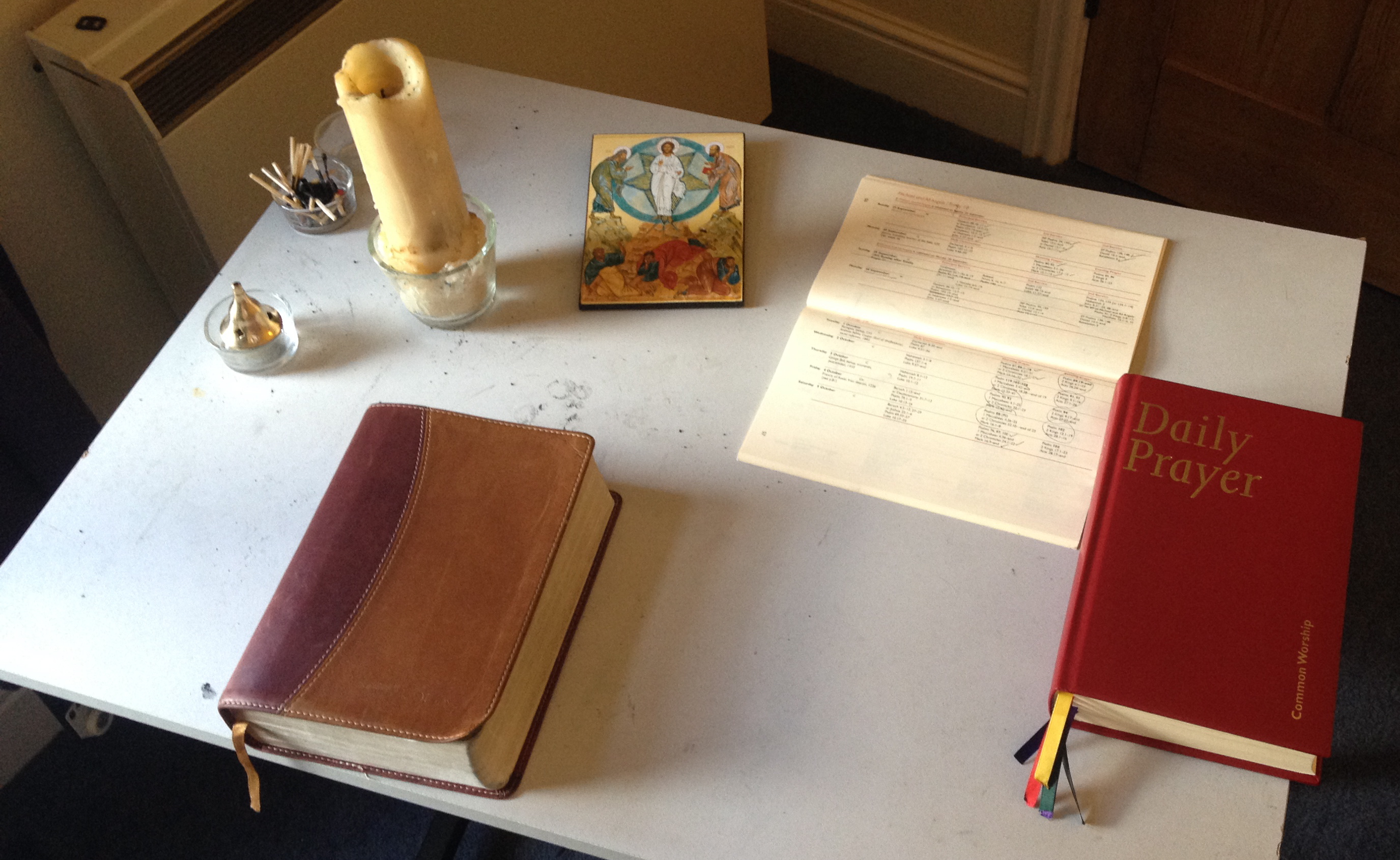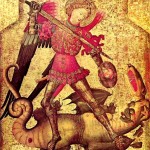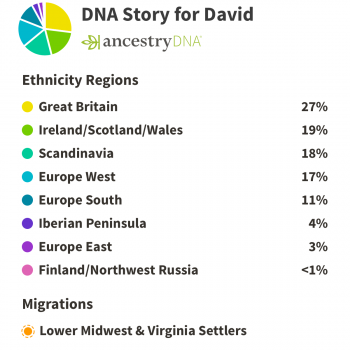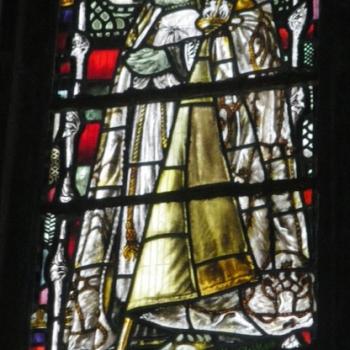David Russell Mosley
Ordinary Time
11 February 2015
The Edge of Elfland
Hudson, New Hampshire
Dear Friends and Family,
On Monday I posted a list of questions stolen from God and the Machine’s series: How I pray. Today, I want to take this opportunity to answer those questions as best I can. As I said on Monday, I do not offer these as an example of how you ought to pray. I do not think so highly of myself as that. If there is anything I do that you ought to also, it is only because men and women much holier than I have been doing it for much longer. I had considered altering some of the questions to make them perhaps a bit more Protestant friendly. But in an effort to live out consistently and honestly my “Catholic-Evangelicalism”, I am letting them stand and giving my honest answers to them, whomever they may shock or surprise.
Who are you?
While this question was perhaps more intended to explain to readers who this new person is, I do find it a startling and necessary place to begin. Who am I? Am I a father? A husband? A theologian? A poet? A man? An American? I am all of these things and more. Some are accidental to me, not constituting who I am substantially, but constituting the person you encounter whether through these letters or in person. Substantially, I am a Christian, a child of God, adopted into Christ’s sonship and like the pilgrim in The Divine Comedy working my way, by way of my guides, toward the end for which God has made me: the Beatific Vision and deification (which are ultimately synonymous for our vision of the Triune God can be nought else but deifying). I am also a father and a husband (and therefore a man) substantially. These three (or four) things you cannot change about me without changing who I am at my core. Whether other aspects of me, namely being a theologian or poet, are substantial or accidental, I admit to not yet knowing.
What is your vocation?
This is something I’m still discerning. I am, by training, a theologian. Yet, as I have written to you before, I was in the beginning process of becoming an Anglican priest. I don’t yet know to what vocation I am being called, and what my training and inclinations have to do with that, but I am doing my best to listen.
What is your prayer routine for an average day?
In the mornings, I get up between 3:30 and 6, feed my son, Theodore, go downstairs, and say Morning Prayer. I try, but often fail, at saying Evening prayer between 2:00 and 7:00. I follow the Anglican tradition of keeping Morning and Evening Prayer (based on a shortened form of the Benedictine practice of the Divine Office), using Daily Prayer from the Common Worship. This was the first prayerbook I ever had and like using it to keep up with the Church Calendar. It also adds a level of asceticism to my life that I find I need. Throughout the day I try to pray. I often journal after saying Morning Prayer and this usually includes several prayers, typically for forgiveness. Otherwise, I say prayers when I feel led to or when I need to. I would like to have some more form to my prayer life and am working on it.
How well do you achieve it, and how do you handle those moments when you don’t?
It is difficult for me to achieve this every day. What with twins, living with my Grandmother-in-law in a small condo, and making excuses like the proceeding two, I often fail. I try not to be too hard on myself about it, not disparaging myself, but reminding myself to the standard to which I am holding myself.
Do you have a devotion that is particularly important to you or effective?
In difficult times I often turn to a prayer I learned when reading the works of John Cassian. “Make haste, O God, to deliver me!
O Lord, make haste to help me!” It is from Psalm 70. This prayer when prayed repetitively has been a help in fighting temptation, though I do not turn to it as often as I like.
Do you have a place, habit, or way of praying?
While I hope to someday have a prayer corner filled with icons and religious imagery, for now, in the space we share, I have to settle for something a bit less. I tend to pray Morning Prayer, the one I can ensure I do without others around, in the recliner in my Grandmother-in-law’s living room. I intend also to begin kneeling while doing more formal prayers and perhaps trying other positions for the less formal, like prostration. The body is just as important in the act of prayer as the soul. Our posture, our position can aid or hinder our prayer. Equally, the soul lifts the body to new heights, and depths, in prayer.
Do you use any tools or sacramentals?
I have a few icons that I use, when I’m in the same room as them. Though considering it now, perhaps I will begin bringing them down with me so as to have them for my prayer time.
What is your relationship with the Rosary?
If icons didn’t turn off or confuse some of my Protestant correspondents (for I think of you all, whoever to you all are, as correspondents and not readers), then perhaps my answer to this question will. I have previously written a reflection about praying to departed Christians, the Saints. It stands to reason, therefore, that if I think calling on them for prayer is permissible, so too is calling on the Mother of God. That being said, my prayers to Mary have been limited up to this point by asking her to watch over my sons as she watched over her own son who is Christ our Lord. I have, however, recently acquired a Rosary and have begun to use it at least once daily. In my early days as a Christian, which were not so long ago, I would have thought this if not totally, then at least partially idolatrous. However, I have found my use of the Rosary in prayer to be of profound aid and edification.
Some of you may balk still, but when one looks at the actual prayer, it is mostly Scripture:
Hail Mary, full of grace.
Our Lord is with thee.
Blessed art thou among women [Lk 1.28],
and blessed is the fruit of thy womb [Lk 1.42],
Jesus.
Holy Mary, Mother of God,
pray for us sinners,
now and at the hour of our death.
Amen.
The rest, as you can see, is simply asking for Mary to pray for us. There is nothing, in my opinion too scandalous about this. I have also been influenced by Stratford Caldecott in his book All Things Made New which tells us that the Rosary is entirely about Christ, through the eyes of Mary. I hope to write about that book more soon.
Is there one particular book or spiritual work that has been particularly important to your devotional life?
This is a difficult question for me to answer. On the one hand, the Institutes and Conferences of John Cassian are the primary books that led me down the path of liturgy and asceticism, in fixed hour prayers. However, since then the works of Gregory of Nazianzus, Augustine of Hippo, Thomas Aquinas, and others have been my guides in my devotional life.
What is your current spiritual or devotional reading?
I recently finished reading the Ambigua of Maximus the Confessor and began reading the works of Anselm in this capacity. However, that reading has strayed out of the devotional and may need to be replaced by something else, or at least a reconfiguring of how I read it.
Are there saints or other figures who inspire your prayer life or act as patrons?
St Thomas Aquinas has been a recent inspiration for my prayer life. His prayers and hymns, which I have only recently begun to read and pray myself, are ones I often turn to throughout the day. C. S. Lewis has also been a guide when it comes to prayer, especially his Letters to Malcolm which I hope to re-read soon. I’m sure this list will grow. St Benedict, St Patrick, and St Augustine are also frequent sources of inspiration in prayer. Another I hope to interact with more is my, unintentional, namesake, St David of Wales, patron saint of poets.
What is one prayer you find particularly powerful or effective?
Aquinas’s Prayer for the Attainment of Heaven is one I find particularly powerful. It helps me keep the cosmic as well as individual scope of the life in Christ. I have written about it here.
Have you had any unusual or even miraculous experiences in your prayer life?
There have been times in the past, but none of them can I really remember. The most recent happened while we were still living in the United Kingdom during the intercessions at a Spoken Eucharist service at the parish church in Beeston. I have written about it here. Dreams, visions, and miracles are things I think we are meant to court, but warily. The devil can also show us pictures as he did to Christ in the desert. Nevertheless, there is an inherently visionary aspect to our faith. God is the God who gives dreams and visions and we his people ought to be open and prepared to receive them.
I’d like to see _______YOU_______________ answer these questions.
Sincerely yours,
David











